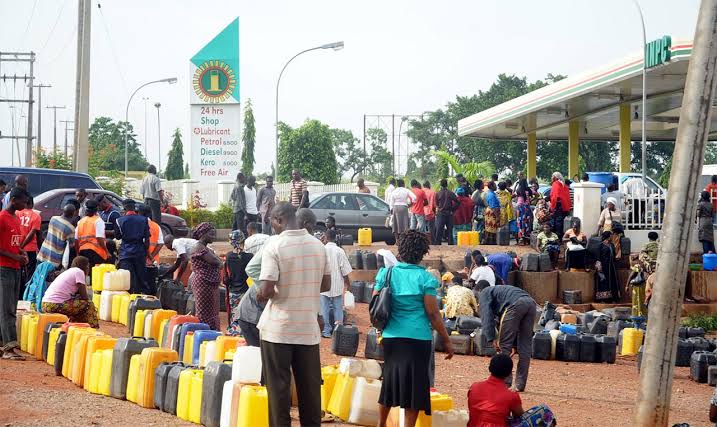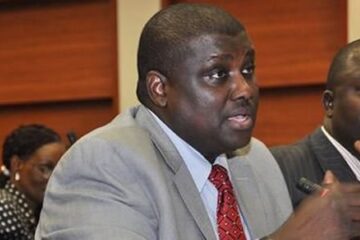
Fuel scarcity... Photo credit: File
A senior government official and marketers have dashed the hope of an early resolution of the fuel crisis problem by claiming that supply hitches may not end any time soon.
The senior official in the Ministry of Petroleum Resources, who spoke to The Punch on condition said the fuel scarcity might get worse in the days and weeks to come as there were many issues affecting the smooth supply of the product across the country.
According to him, the inability of the NNPC Limited to import sufficient volume of Premium Motor Spirit (petrol) is primarily responsible for the current scarcity.
He explained that the NNPCL did not have sufficient funds to import the required quantity of fuel for domestic consumption and the situation was compounded by the falling value of the naira as the company had to source for scarce forex to buy petrol from abroad and pay shipowners, who convey it to the country.
The official said, “The dollar issue is a major problem as the NNPCL is running helter-skelter to get forex to import fuel, yet the product cannot be sold at the market value; so, it is bearing some part of the cost in the form of subsidy. You can’t get products at higher rates and sell at lower rates and there won’t be crises.
“The Federal Government is worried that the removal of subsidy a month to the general elections will be disastrous as the organised labour will mobilise the citizens to resist it and the security agencies may not be able to contain the attendant upheaval. This, of course, will affect the chances of the ruling All Progressives Congress in the elections.
“The President does not want to leave a country in turmoil for his successor and that is why he made provision for subsidy till June. It will be the decision of his successor to retain or remove it. Whoever wins the presidential election will face a tough time.”
The source also explained that the inability of the country to produce enough crude oil to meet its Organisation of Petroleum Export Countries’ quota was another problem, noting that insecurity and crude theft had significantly affected the production capacity.
He added, “Another issue is the failure of the crude swap for refined products deal that the NNPCL had with major international oil firms and traders. The inability of the NNPCL to meet its own side of the deal by supplying the required quantity of crude has frustrated the arrangement.
“While Nigeria has been taking refined products from the partners, it has not been able to supply the crude equivalent and the international firms and traders have stopped shipping products to the country.”
Oil marketers, on Saturday, also alluded to the problems in the downstream sector and predicted that the current scarcity would not abate until the government comes out with a clear position on subsidy removal, full deregulation and price determination.
They also faulted the claim by the Federal Government that it had not increased the pump price of petrol, as they continued dispensing the commodity at exorbitant rates.
The Minister of State for Petroleum Resources, Chief Timipre Sylva, had announced on Friday that tPresident Muhammadu Buhari did not approve any hike in petrol price.
This was after oil marketers stated that the government might have commenced the gradual removal of subsidy on petrol, as they stated that the cost of PMS was raised on Thursday from N175/litre to N185/litre.
It was observed that PMS was sold for as high as N250/litre and N300/litre in the few outlets of independent marketers that had the product in Lagos and Ogun states as well as Abuja on Saturday.
Few filling stations operated by major marketers dispensed the commodity at between N185/litre and N194/litre in the state and the Federal Capital Territory contrary to the minister’s statement.
Khalif Civic Oil & Investment Limited, for instance, which is a filling station located in Kubwa, a satellite town in Abuja, sold petrol for N295/litre and still had queues.
Other outlets that dispensed fuel, particularly those operated by major oil marketers, also had long queues.
The Nigerian Midstream and Downstream Petroleum Regulatory Authority did not confirm whether it had approved an increase in the pump price of petrol or not when contacted on Saturday.
“I cannot confirm that to you know, because I don’t have information on that right now,” the NMDPRA spokesperson, Kimchi Apollo, stated.
However, officials of the NNPCL and NMDPRA attributed the fuel scarcity in Abuja and environs to gridlock following an accident involving three oil tankers on the Bida-Agaie Road in Niger State on Friday.
They disclosed this during a special visit to assess the situation at the Suleja Depot, adding that though the development had affected the free flow and arrival of tankers in the Suleja area and some northern states, the situation was being resolved and normalcy was expected to return before Monday.
The Executive Vice President, NNPCL, Adeyemi Adetunji, stated that to resolve the distribution logistic issues and restore normalcy, the cost of marine transportation with the marketers was being resolved.











